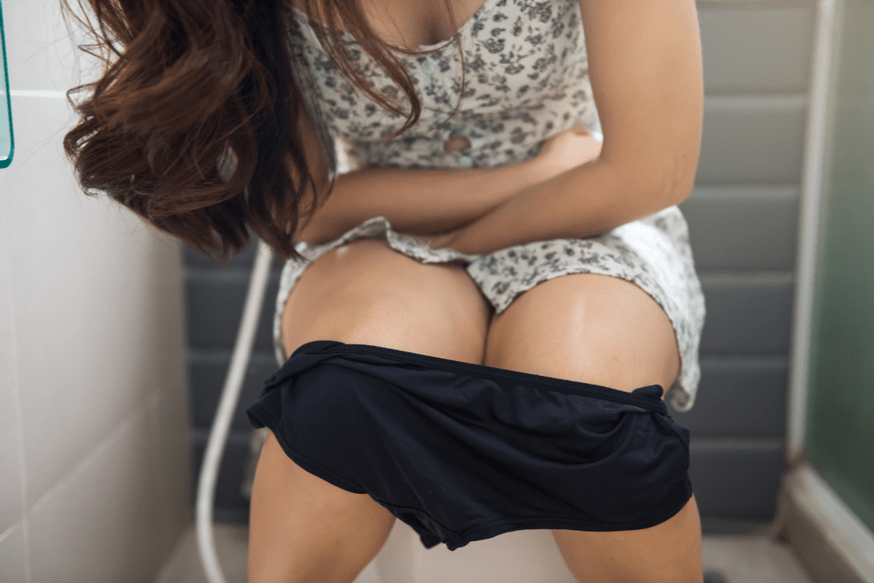
Why peeing after sex can be painful

Pain when peeing after sex, cloudy urine, burning sensations down there, and constant visits to the toilet. Unfortunately, many women suffer from this. What is it? These symptoms can indicate an STD, but most of the time, it means that you have a serious bladder infection.
What does a bladder infection feel like?
Do you know that burning sensation when you urinate? And have you noticed that peeing often hurts more after sex? Unfortunately, pain when urinating is a well-known phenomenon among women, especially after a hot session between the sheets. It can happen both during and after peeing, and ranges from mild irritation to the feeling of a burning knife being pushed up your urethra.
As if all of that isn’t already miserable enough, the pain usually doesn’t come on its own. You may often feel the need to urinate, even when you’ve just been to the toilet. Itching, abdominal pain, lower back pain and cloudy, strong-smelling urine are also notorious partners in crime when you suffer from this condition.
Do you recognise these symptoms? Then you probably have a bladder infection. We’ve listed the symptoms for you:
- Peeing hurts and causes a burning, itching sensation
- You constantly feel like you have to use the bathroom
- You urinate in small amounts
- It never feels like your bladder is empty
- You feel pain or tightness in your abdomen, pelvis, or lower back
- Your urine is dark, cloudy, and can have a strong odour
- Your urine may show traces of blood
Why do women often get a bladder infection (cystitis)?
This has everything to do with our physique. Our urethra and anus are closer together than in men. This makes it easy for microbes from the gut to find their way to our urethra and bladder. The E-coli bacterium is one of those devious microbes with an untamed urge to roam around. We carry this bacterium around in our gut, and it usually hangs out in and around the anus.
When we’re having sex, and our bodies are intertwined with someone else’s, it’s easy for bacteria from the anus to enter the urethra. After all, we touch everything during sex, and so we spread the bacteria from our skin to vulnerable areas.
Because our urethra is relatively short, E-coli can then easily move towards the bladder. There it sneakily settles in to cause inflammation.
Mother Nature
That means sex is a major risk factor for cystitis. Our anatomy already puts us women at greater risk for a bladder infection, but after hot, humid, and fluid-exchanging sex, the chances are even higher.
Fortunately, Mother Nature is intelligent. Normally, your vagina is full of acidic bacteria that fight nasty infections. However, sometimes your resistance is less than optimal, and these are the moments when bacteria see their chance. The chance of these little buggers doing their dirty work depends on several factors.
Your health and hormonal condition are important signal points. For instance, women with diabetes or post-menopausal women are more likely to get a bladder infection. Additionally, the type of sexual contact also has an influence. Anal sex? Biting? Prolonged penetration without being wet or lubricated? We’ve got some bad news: all of these increase the risk of a bladder infection.
‘Honeymoon cystitis’
New flings also increase the risk of a nasty infection. If you suddenly have a lot of sex after a period without penetration, the risk of a bladder infection is much higher than normal – for example, when you have a new sex partner, are head over heels in love, or are going on holiday together for a week after relatively dry previous years. In Anglo-Saxon countries, this is even called “honeymoon cystitis”.
Apparently, your body needs time to get used to foreign bacteria. Or maybe you’re having a lot of sex during those first glorious months together, which gives bacteria even more of a chance to settle in places they don’t belong. Often, you’ll find that the situation improves when you’ve been sleeping together more regularly and when your sex life is more relaxed.
How to prevent a bladder infection
Unfortunately, you can never completely prevent a bladder infection, but there are always clever tips and tricks that can reduce the risk. The best ones are:
1: Always empty your bladder before sex.
2: Go straight to the bathroom after sex. It’s not very romantic, but a nice pee will flush out bacteria before they have a chance to invade your bladder. Rinse your vagina with water afterwards.
3: Drink a large glass of water after sex. Some bacteria can remain after that first post-sex pee. Drinking plenty of water will make you go to the toilet quickly and will give your body the chance to flush out the last nasties in time.
4: Drink plenty of water and herbal teas and use cranberry tablets to maintain your vaginal flora. Avoid coffee, soft drinks, and alcoholic beverages as much as possible.
5: Avoid soap, vaginal douches, and intimate sprays. Your vagina is perfectly capable of keeping itself clean. A vaginal douche disturbs the PH balance in your vagina, making it more susceptible to infections and inflammations. Regular rinsing with water is enough.
6: Stating the obvious? Sure, but it never hurts to repeat it again: do not have vaginal contact after anal sex!
Do you still suspect that you have a bladder infection? Visit your doctor. They’ll check your urine for inflammation and prescribe a course of antibiotics. In any case, make sure that you seek help. An untreated inflammation of the bladder can “climb up” and cause inflammation of the renal pelvis.
Are you still experiencing symptoms 2 days after the treatment? And do you have additional complaints, such as blood in your urine, fever, and severe pain in your lower back? Immediately go back to your doctor for further examination.
Other causes of pain in urination
Of course, there are other possible causes for pain when urinating. We often underestimate the importance of a well-fed and moist vagina during sex. If your partner penetrates while you’re not sufficiently wet, the skin of your vagina becomes irritated.
Rough sex can also damage the skin of your vagina. This doesn’t just result in painful penetration; it also makes urinating after sex feel painful. Urine is a strong substance, especially when it flows along irritated or damaged skin.
Strong memory
Unfortunately, your vajayjay has a very strong memory. She doesn’t like pain, so she’ll tighten up at the first attempt at penetration. The result? A tighter opening, making sex even more painful. After all, vaginas don’t get moist when they expect pain!
If you find yourself in this situation, it’s important to break the vicious cycle. Start slowly, make sure you’re sufficiently turned on and moist, or use a lubricant. Relaxation exercises can also help you to release tension in your pelvic floor, which makes penetration easier.
Is sex still painful? Then you can always seek help from a sexologist or pelvic floor specialist.
Painful blisters
Unfortunately, it’s also possible that you’ve contracted an STD. Chlamydia, gonorrhoea, and herpes can all cause pain when urinating. Of course, not all STDs are the same. A herpes infection, for instance, will lead to painful blisters at the entrance of your vagina, which of course will not react well to passing urine.
With chlamydia and gonorrhoea, it’s less easy to see whether you’re infected or not. However, the consequences of being infected with one of these STIs are obvious. If not treated properly, you run the risk of inflamed fallopian tubes and infertility.
So have you had unprotected sex and do you have pain when urinating? And, has your doctor concluded that you don’t have a bladder infection? Get tested for an STD, just to be sure. If you don’t feel like going to the doctor, you can always visit our web shop. There you can order an STD test with lab analysis, completely anonymously. You’ll receive the results within 2 days!







Respond or ask a question
0 comments